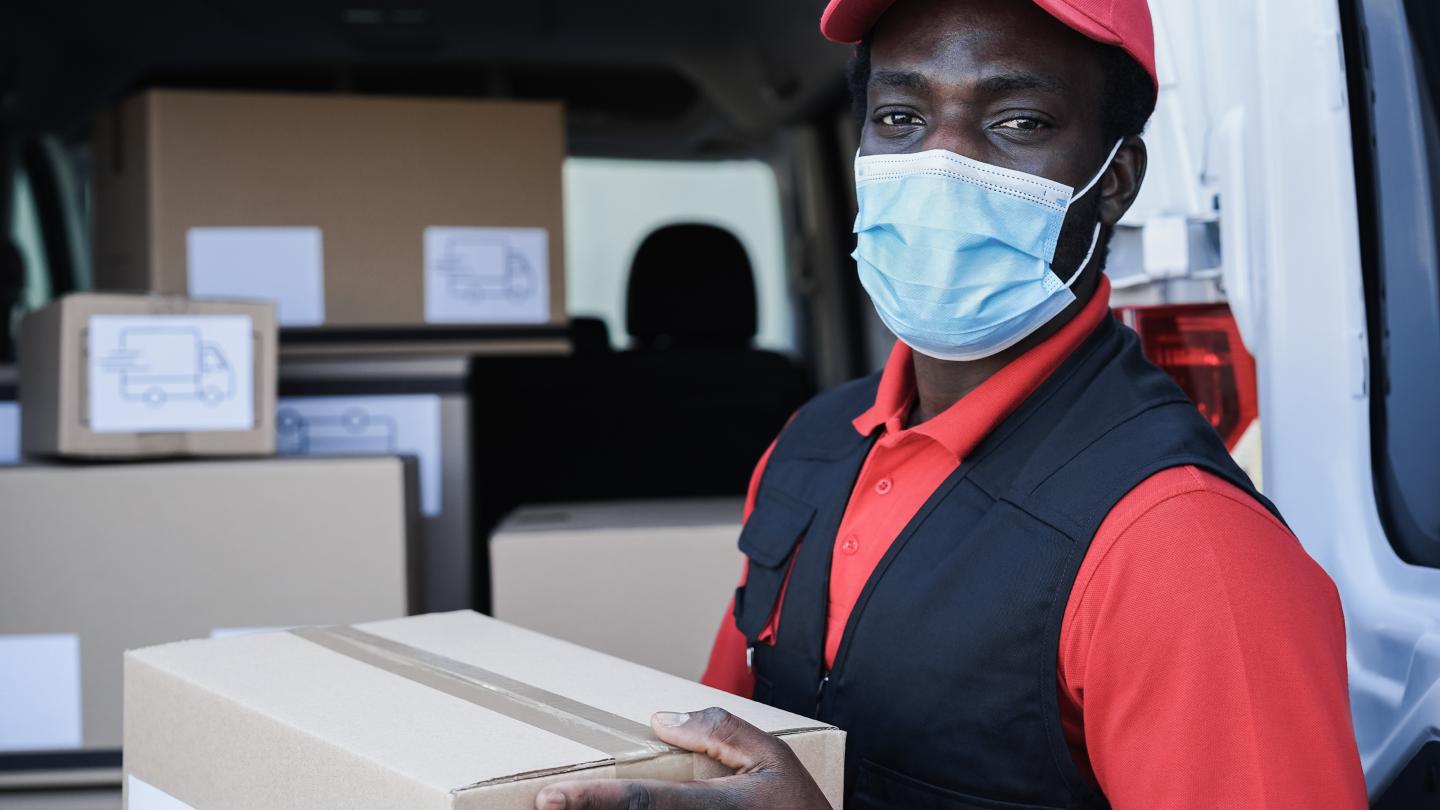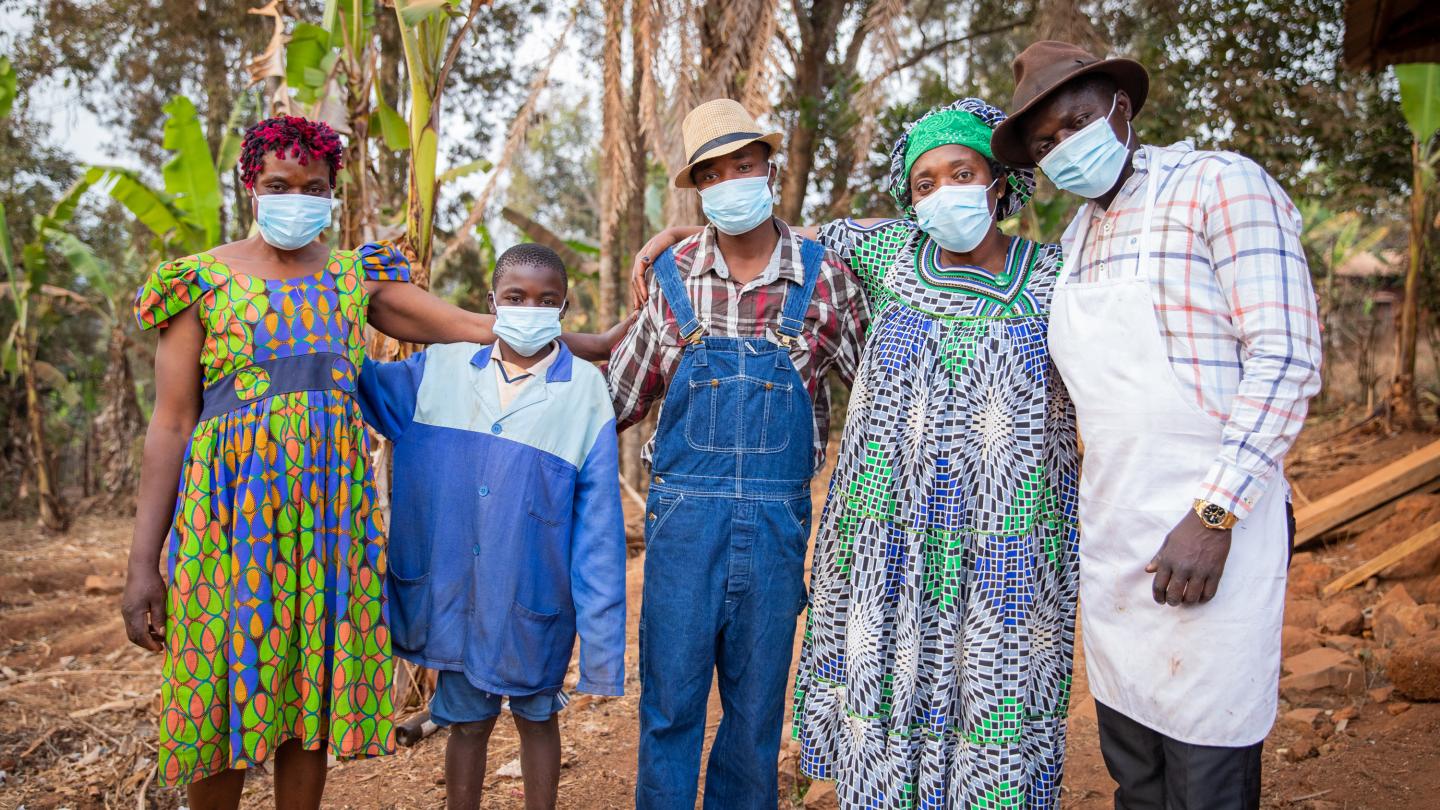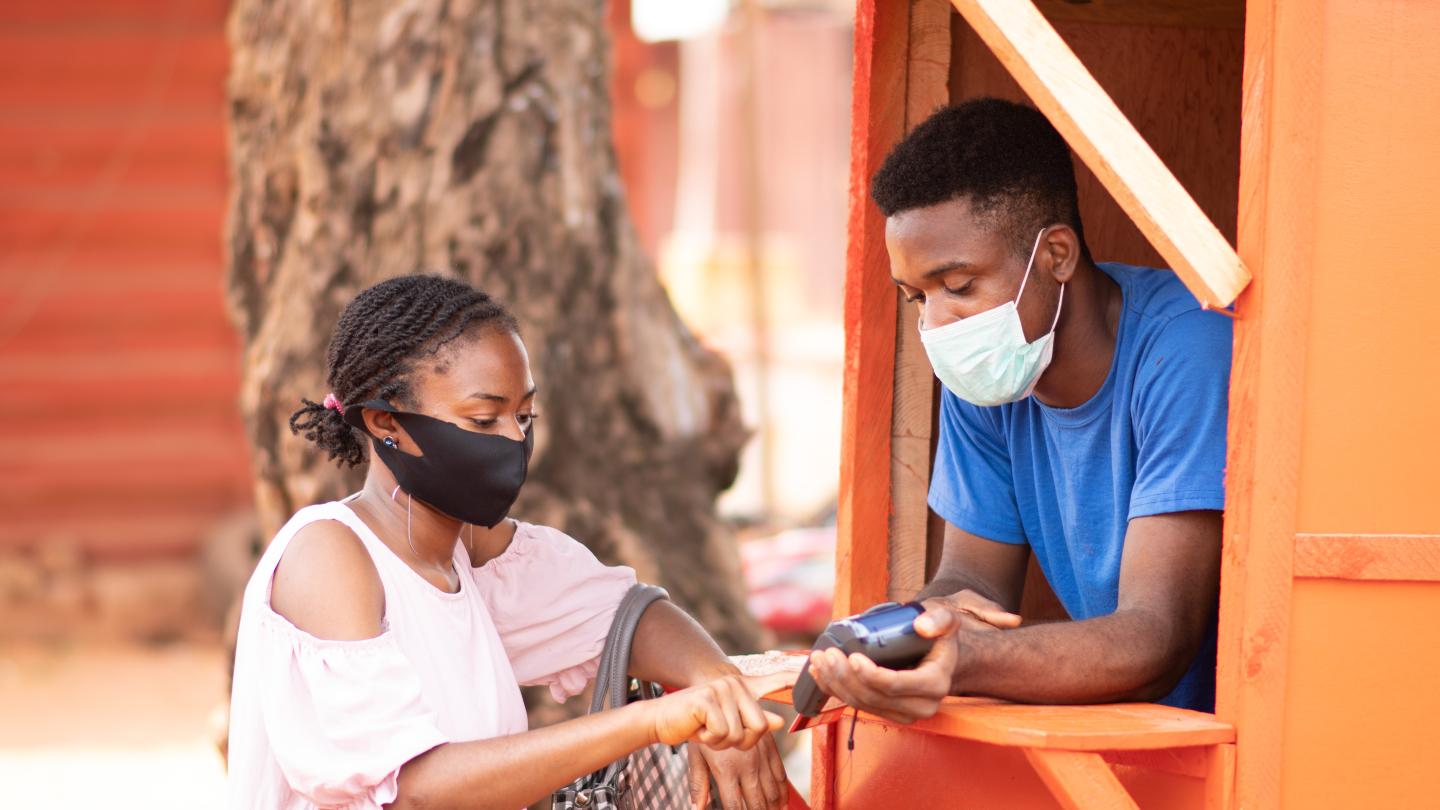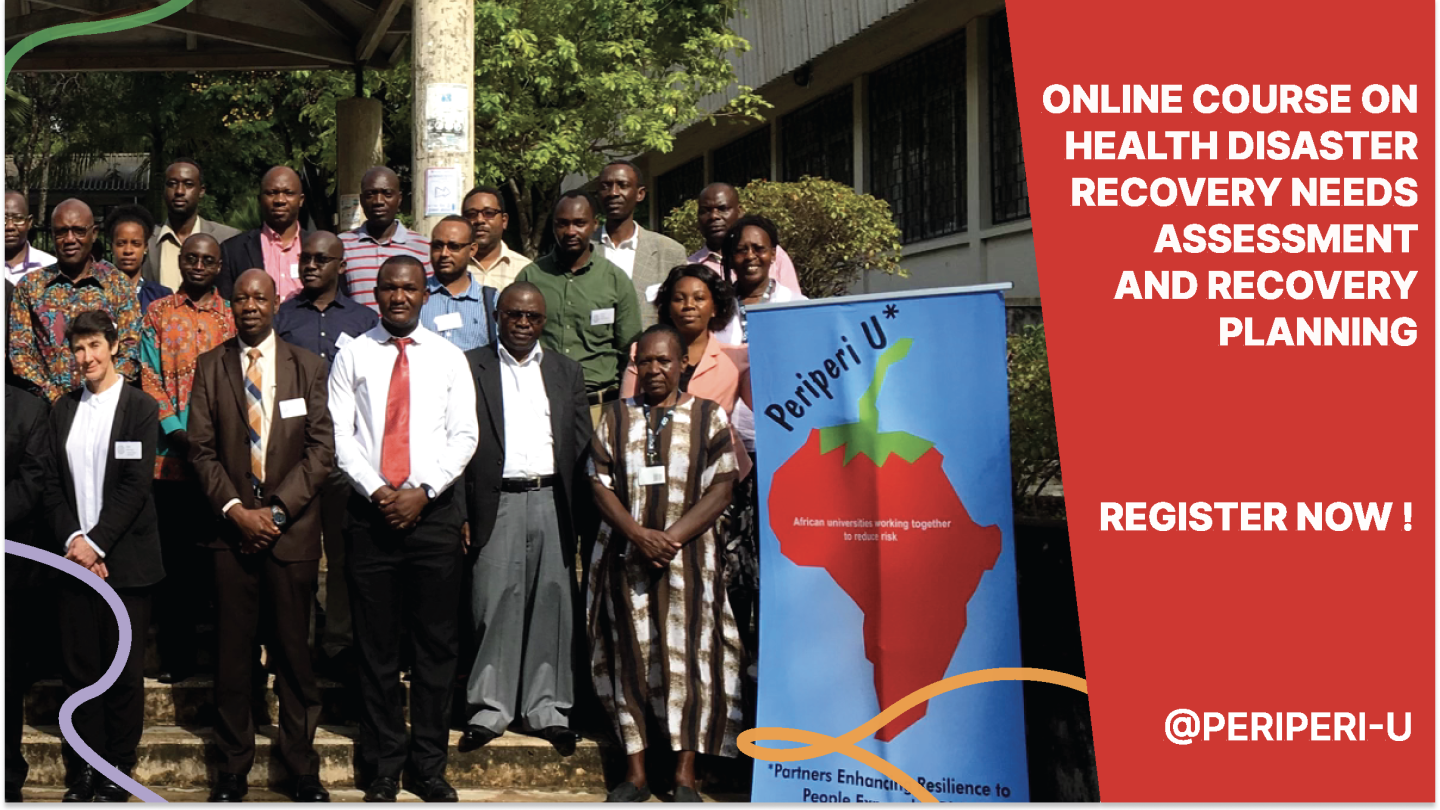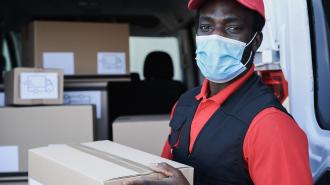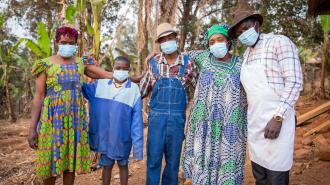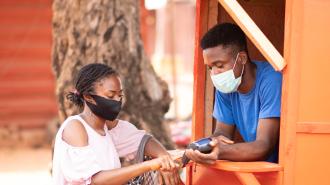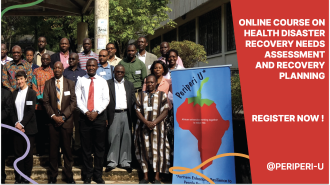Sahel Resilience Project
Building Health Risk Governance and Recovery Capacities
Online Courses
Health Disaster Recovery Needs Assessment and Recovery Planning Online Course
22 April – 7 May 2025
The United Nations Development Programme (UNDP), in partnership with Stellenbosch University — host of the secretariat of the university consortium Partners Enhancing Resilience of People Exposed to Risks (PERIPERI U), which comprises 12 African academic institutions enrolling 2,000 students in total — is pleased to expand its training offer into an advanced online course on Health Disaster Recovery Needs Assessment and Recovery Planning (HDRNA).
This capacity-building initiative is made possible thanks to the support of the Government of Sweden, through the Sahel Resilience Project, and the European Union, through the Strengthening Capacities for Crisis Assessment, Recovery Planning and Peacebuilding (PDNA/RPBA IV) project.
Designed and delivered with PERIPERI U, the online course in English and French brings together 48 disaster risk reduction (DRR) and health professionals, including 16 women, from across Africa over three weeks. It offers an in-depth, practical learning experience focused on strengthening national and regional capacities to assess health-related disaster impacts and plan for resilient recovery.
The course takes place across nine webinar sessions scheduled as follows:
- Tuesday 22 April, Wednesday 23 April, and Thursday 24 April 2025
- Monday 28 April, Tuesday 29 April, and Wednesday 30 April 2025
- Monday 5 May, Tuesday 6 May, and Wednesday 7 May 2025
The course draws on global best practices and methodologies from the World Health Organization (WHO), European Union, United Nations, and World Bank, and is rooted in the internationally recognized PDNA and RPBA frameworks. Over nine interactive lessons, participants will explore key concepts, apply tools through group exercises, and develop the essential components of a post-disaster needs assessment and recovery strategy, with a focus on the socio-economic and health sectors.
The webinar sessions are facilitated by two experienced facilitators:
- André Griekspoor, a medical doctor and global expert in health emergencies, with over two decades at the World Health Organization, and deep expertise in health recovery, system strengthening in crisis contexts, and humanitarian programming.
- Dominique Blariaux, a senior PDNA expert with over 30 years of experience in disaster risk management, food security, and recovery planning, working with governments and international institutions across Africa, Asia, and the Pacific.
Testimonies
"Participating in this training on Health Disaster Recovery Needs Assessment is an enlightening experience for me, both professionally and personally… It provides me with both theoretical and practical knowledge necessary to contribute in building stronger and more resilient health systems.” – Habibu Balarabe, Nigeria
“The use of practical case-based learning not only reinforces theoretical understanding but also enables immediate application of knowledge—making it especially effective for peer learning and group engagement.” – Anonymous Participant
“I’m particularly interested in topics related to chemical risk. My research focuses on environmental pollution from artisanal gold mining sites, the associated ecological and health risks, and strategies to promote more sustainable artisanal and small-scale gold mining practices.” – Edmond Kohio, Burkina Faso
“I’m a clinical healthcare practitioner with expertise in public health, monitoring and evaluation of donor-funded health programmes. My research focuses on human and environmental health, food security, and strategic health information systems management—all aimed at strengthening health systems and improving community well-being.” – Roswitha Mahalie, Namibia
A first self-paced online course in 2023
UNDP and PERIPERI U launched a first online course in English and French titled Health Disaster Recovery Needs Assessment and Recovery Planning on 18 October 2023. This initiative served as a learning platform for sharing valuable insights, exchanging best practices, and disseminating novel information and methodologies, empowering those dedicated to addressing health disaster recovery.
It drew on expertise from the World Health Organization (WHO) and incorporated materials and lessons on post-disaster recovery curated by international organizations such as the European Union, the United Nations, the World Bank, and WHO.
Financial support for the course’s presentation, content development, and implementation was provided to UNDP by the European Union’s Strengthening Capacities for Post-Disaster Needs Assessment and Recovery Planning – PDNA Roll Out III Project through the Disaster Risk Reduction and Recovery Building Team (DRT), Crisis Bureau, as well as by the Government of Sweden through the Sahel Resilience Project.
Thirty-five (35) students, early-career experts, and established professionals working in the field of disaster risk reduction were certified following this self-paced, free-of-charge, online training.
Photo credits | Adobe Stock/UNDP
UNDP responding to COVID-19 and concurrent disasters in Sahelian countries and beyond
A comprehensive approach to risk governance in the Sahel and Lake Chad region and the African continent extends beyond the challenges posed by the COVID-19 pandemic and other disasters. In a region grappling with various complex issues such as conflicts and climate change, there's a pressing need for a holistic strategy to manage and mitigate risks. Experts emphasize the significance of disaster preparedness and swift recovery in the face of these challenges.
COVID-19 has emerged as a litmus test of the resilience and adaptability of existing disaster risk management systems and governance mechanisms. In this context, UNDP remains committed to bolstering the capacities of both regional and national stakeholders to facilitate disaster recovery and risk reduction. This commitment is founded on the recognition that addressing intersecting risks that impact populations is imperative for sustainable development and resilience-building.
Socio-economic impact of COVID-19 and the role of disaster risk governance in Western Sahel and Lake Chad Basin
An in-depth assessment of the socio-economic impacts of COVID-19, co-commissioned by the Economic Community of West African States (ECOWAS) and UNDP, delved into how to better recover from the pandemic, and within that, the crucial role of disaster risk governance in addressing vulnerabilities in Sahelian countries – Burkina Faso, Chad, Mali, Mauritania, Niger, Nigeria, and Senegal. The research conducted by Data-Pop Alliance and ADE | Evidence for Better Policy provides national, regional, and international policymakers and civil societies with solid information and working hypotheses to address the fault lines once again exposed and exacerbated by the crisis in their stabilization and recovery efforts to building back better. The full report, and a policy brief, are available in English and French.
Training and capacity building on CRNA methodology
UNDP has actively engaged with PERIPERI U from 2020 onwards. This initiative was carried out through the Sahel Resilience and PDNA Roll Out III projects, funded by Sweden and the European Union, respectively. It aimed to establish a regional pool of trainers and a cadre of government practitioners proficient in COVID-19 Recovery Needs Assessment (CRNA) and Recovery Planning.
The CRNA methodology, a collaborative effort between the EU and UNDP, was introduced through an online training programme, involving 37 lecturers, master's and Ph.D. students from higher education institutions and 44 government officials from seven countries* in the Western Sahel and Lake Chad Basin. Staff from the African Union Commission (AUC), ECOWAS, and members of the Africa Youth Advisory Board for Disaster Risk Reduction were also invited. The sessions took place in 2020 on 17–20 November for academic participants, and 1-4 December for government officials.
The CRNA aligns with the Post-Disaster Needs Assessment (PDNA) and Disaster Recovery Framework (DRF) methodology, of which UNDP, the EU and the World Bank are lead partners in capacity building, further adapting these approaches to the context of the COVID-19 pandemic. The CRNA has become a vital tool for conducting assessments and planning recovery strategies to rebuild the physical, social, and human capital of health disaster-affected communities.
* Burkina Faso, Chad, Mali, Mauritania, Niger, Nigeria, and Senegal
- Guidance note on CRNA
- Officials and academics learn to assess post-COVID-19 needs, effects and impacts
Integration with other initiatives
COVID-19 recovery framework for Africa
UNDP played a crucial role in supporting the AUC for the development of a continental recovery framework for COVID-19, which was adopted by AU Member States in February 2022. This institutional framework guides resilient socio-economic recovery efforts at the continental, regional, and national levels, aligning with the Sendai Framework for Disaster Risk Reduction and the Africa Programme of Action.
Enhancing early warning and early action system for Africa
The Sahel Resilience Project supported a comprehensive assessment and development by the AUC of an institutional and operational framework for multi-hazard early warning and early action system for Africa. These informed the development and ongoing implementation of a seven-year continental programme, including the establishment of four situation rooms*, the operationalization of governance mechanisms, and capacity building of AUC, RECs and Member States. Financial and technical support is provided by Italy along with UNDRR, CIMA Research Foundation, UNDP, Sweden, GIZ on behalf of Germany, and others.
* The continental multi-hazard situation room at AUC in Addis Ababa and the regional early warning centre at ECOWAS in Abuja are interconnected with the African Centre of Meteorological Application for Development (ACMAD) in Niamey, and the Intergovernmental Authority on Development-Climate Prediction and Applications Centre (IGAD-ICPAC) in Nairobi
National Activities
Burkina Faso
UNDP Burkina Faso has collaborated with the government to develop a Community Mobilization Strategy for Crisis Recovery. This strategy provides operational guidance and COVID-19 Information, education, and communication materials to address community needs in the central region, high basins, and the Boucle du Mahoun.
Chad
UNDP Chad has facilitated the establishment of an effective COVID-19 crisis coordination mechanism, led by the Ministry of Health in collaboration with various government agencies. The Sahel Resilience Project has enabled the setting up of a geographic information system to collect and analyze disaster-related data, further providing essential supplies to civil protection staff.
Mali
In Mali, UNDP has extended support from the Sahel Resilience Project to an ongoing Japan-funded response. Efforts have focused on the local production by SMEs of affordable masks to create economic opportunities and training sessions for school communities to implement mitigation measures.
Mauritania
UNDP Mauritania has evaluated technical and operational needs related to COVID-19 response efforts and facilitated the creation of Regional Emergency Management Committees. These committees allowed for better coordinating the emergency response across all regions of Mauritania.
Niger
UNDP Niger has supported a study on the Impact of COVID-19 on food, nutritional and pastoral security, providing critical insights to address the increased food insecurity caused by the pandemic. The study emphasized the importance of addressing disruptions in food supply chains and their impact on vulnerable households.
Nigeria
In Nigeria, UNDP, in collaboration with its Accelerator Lab, has explored environmentally safe and innovative solutions for medical waste management. The initiative aimed to mitigate the impact of the pandemic on livelihoods and the environment, particularly in the informal sector.
Senegal
UNDP Senegal has supported the Civil Protection Directorate in implementing effective communication strategies and risk mitigation measures related to COVID-19. Community radios and women's associations played a critical role in disseminating information on mitigation measures in local languages, reaching a broader audience.
Partnerships for resilient recovery
Building on the lessons learnt through these experiences and adapting the CRNA methodology, the HDRNA short course offers a comprehensive approach for needs assessment and recovery planning for health disasters and aims at strengthening capacities for health disaster recovery preparedness.
The collaboration between UNDP, academia, and regional institutions through the Sahel Resilience Project and the PDNA Roll Out III showcases a holistic approach to disaster risk reduction and resilient recovery. The integration of the CRNA methodology, capacity building initiatives, and the mobilization of resources reflect a collective effort to prepare for and recover from complex disasters such as the COVID-19 pandemic. By fostering resilience and enhancing capacities at various levels, this initiative contributes significantly to sustainable development and a resilient future for the Sahel region.
The Sahel Resilience Project
Backed by the Swedish government and launched in 2019, the Sahel Resilience Project is a partnership between UNDP, AUC, ECOWAS, the Lake Chad Basin Commission, UN-Habitat, UNDRR, UN Women, the AGRHYMET Regional Centre, PERIPERI U, national disaster management agencies, and gender ministries. It is currently in its second phase of implementation from June 2023 to March 2025.
The Project focuses on seven countries in the Western Sahel and Lake Chad Basin: Burkina Faso, Chad, Mali, Mauritania, Niger, Nigeria, and Senegal. Its main objective is to develop long-term resilience capacities, supporting governments, municipalities, and communities in breaking free from the vicious cycle of humanitarian crises and restoring pathways to sustainable development through risk-informed solutions.
In response to the outbreak of COVID-19 pandemic in 2020, the Sahel Resilience Project reallocated funds to inform and enhance risk governance and bolster the capacities of regional actors, Member States, and stakeholders, enabling effective responses to and recovery from COVID-19 and other crises.

 Locations
Locations

